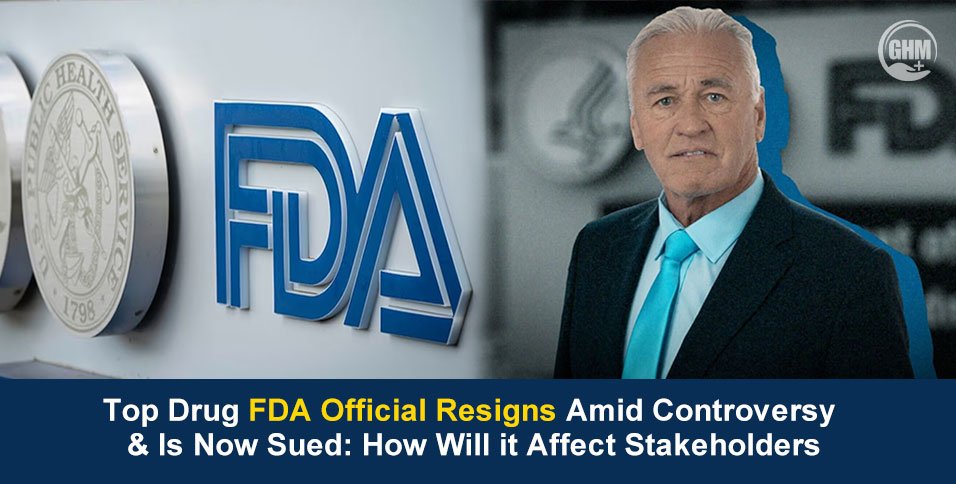The FDA official resigns amid concerns about the agency’s leadership and approval processes. It was also during an ethics investigation and a lawsuit from a pharmaceutical company called Aurinia.
The Food and Drug Administration (FDA) official, George Tidmarsh, was director of the agency’s Centre for Drug Evaluation and Research (CDER) department.
He was placed on administrative leave before resigning, following “serious concerns about his personal conduct” flagged by the U.S. Department of Health and Human Services (HHS) Office of General Counsel.
The resignation comes on the same day a lawsuit was filed by Aurinia Pharmaceuticals alleging that Tidmarsh used his FDA role to make false statements and target the company’s board chair, Kevin Tang.
It is a key drug-evaluation unit that will face a significant disruption due to this resignation and lawsuit, affecting the U.S. drug regulation and its stakeholders.
FDA official resigns: What Difference does it make
CDER, the division headed by Tidmarsh, is responsible for reviewing the majority of prescription and over-the-counter drugs in the U.S.
Therefore, a leadership vacancy creates uncertainty for industry, patients and policymakers.
The FDA official resigns at a time of broader leadership challenges at the agency, signalling possible turbulence in the drug-approval process and regulatory oversight.
For the global healthcare sector, this resignation is a reminder that regulator credibility, process integrity and conflict-management are vital not just in the U.S. but for multinational pharma and global health stakeholders.
What Happened With Tidmarsh at the FDA Agency
- Tidmarsh was appointed in July 2025 as head of CDER.
- In September, he posted on LinkedIn a criticism of a drug, questioning its clinical benefit, which was a rare move for a regulator.
- Recently, he was placed on administrative leave by FDA Commissioner Marty Makary. The next day, the FDA official announced his resignation.
- The Aurinia lawsuit, filed in Maryland, alleges misuse of regulatory authority to pursue personal rivalry and financial advantage.
What are the Allegations against the FDA Drug Unit Chief
The lawsuit claims he targeted Aurinia’s kidney-disease drug, stating it had “not been shown to provide a direct clinical benefit.” The company contends that after the LinkedIn post, its shares dropped 20%, wiping out hundreds of millions in market value.
The complaint further alleges a personal vendetta: that Tidmarsh had a prior dispute with Tang in earlier biotech ventures.
Tidmarsh is facing criticism of his public LinkedIn post, raising questions of conflict of interest and the appropriateness of senior-regulator comments.
According to the HHS statement, “serious concerns about his personal conduct” caused Tidmarsh to resign.
How This Resignation Affects Global Healthcare Stakeholders
- For regulators and policymakers
- When a senior controller leaves, oversight gaps may widen: the FDA official resigns at a time when CDER has lost more than 1,000 staff this year alone.
- The episode raises questions about how the agency vets senior appointees, manages public comments by regulators, and handles social-media behaviour.
- The FDA’s regulatory standards often serve as models globally; this resignation and lawsuit can ripple the credibility with partner agencies and industry in other countries.
- For the healthcare industry & pharma
- Drug-makers watching the ongoing event at the FDA will note potential instability in approval timelines and possible changes in how CDER manages external communications and conflicts.
- The lawsuit and regulator comments raise caution for companies: ensuring no appearance of personal rivalry or misuse of regulator contact can become legal and reputational risks.
- For global pharma with submissions referencing FDA decisions, the uncertainty may slow strategic planning or lead to more conservative engagement.
- For clinicians, patients and the public
- Patients see the resignation of an FDA official as a reminder that regulatory oversight is not infallible, and transparency and accountability matter for drug safety and efficacy.
- Clinicians and health systems must stay alert: changes in leadership can translate into shifts in review practices, risk tolerance and post-market surveillance.
- The general public may lose confidence when a regulator resigns under a cloud of conflict-allegations, making trust-building even more essential.
Looking ahead
As the FDA official resigns, it has become a pivotal moment. The agency now must select a suitable candidate and restore stability in its drug-review processes. The FDA must provide guidelines for senior officials’ use of social media and public commentary.
This incident has the potential to accelerate reforms in how advisory panels, outside experts and internal audits are managed within CDER.
For the global healthcare community, this signals a shift in how regulatory oversight will be portrayed and how stakeholder trust will be maintained.
Conclusion
In conclusion, when an FDA official resigns amid controversy, the implications extend far beyond the United States. It affects the drug-approval landscape, global pharmaceutical strategy, patient safety and the public’s trust in regulatory institutions.
Stakeholders across healthcare, from policymakers and industry to clinicians and patients, must pay attention to how the agency responds, reforms, and rebuilds its credibility.













